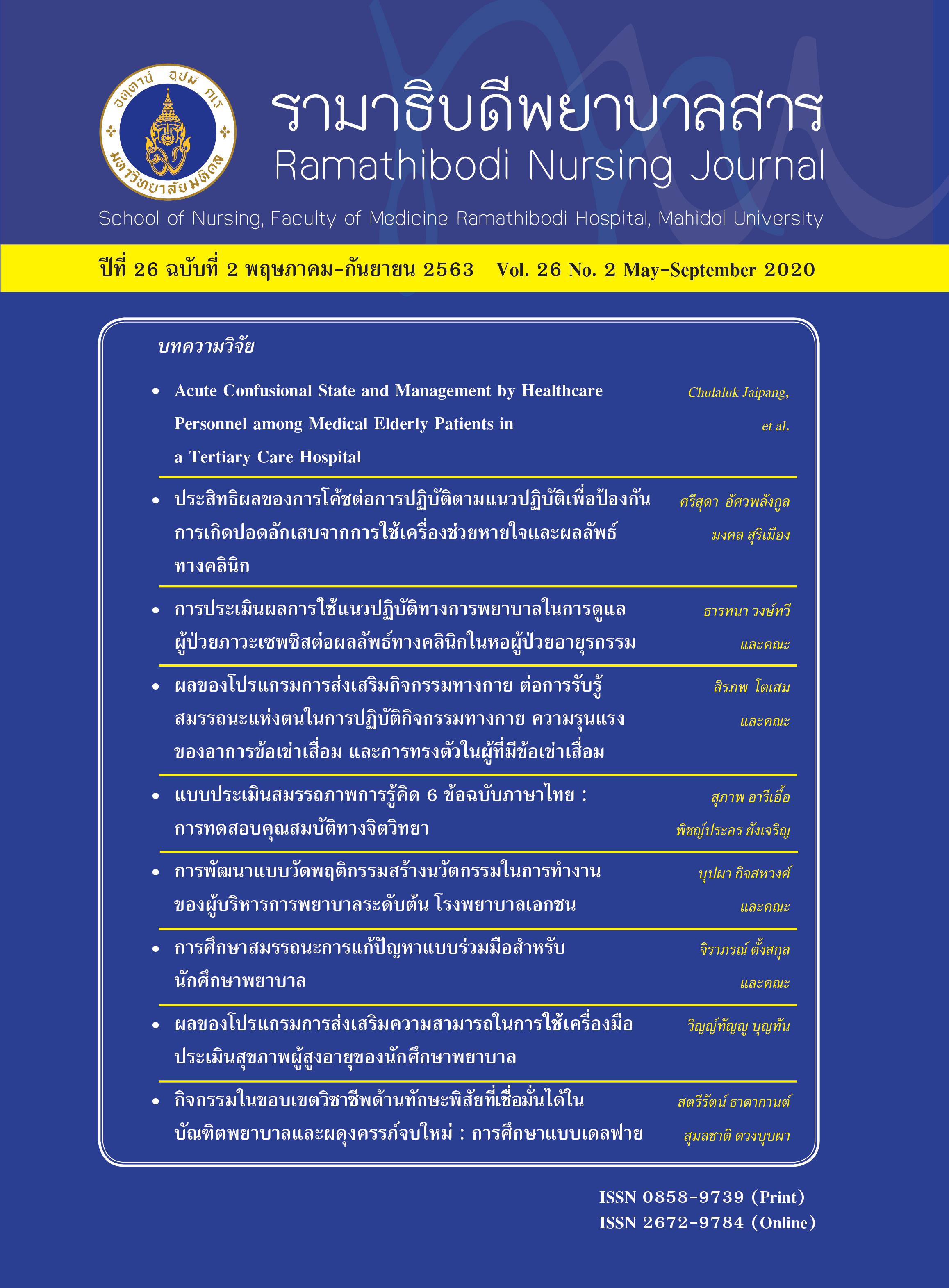Psychomotor Entrustable Professional Activities of Newly Graduated Nurse-Midwives: A Delphi study
Main Article Content
Abstract
This research study aimed to study psychomotor activities that newly graduated nurse-midwives could practice with and without supervisors by using the entrustable professional activities framework (EPAs). The Delphi technique was used to gather information. A sample of 30 nursing experts was recruited. Fifteen of them were from nursing education, while the other 15 were from nursing services. One hundred and
forty-seven psychomotor activities with 5-point rating scales of newly graduated nurse’s practice ability were listed as a tool. Data were analyzed using median and interquartile range to get the consensus of experts. The research findings showed that the psychomotor activities, which newly graduated nurse-midwives could practice without supervisors as the expert consensus, included 23 activities. However, the psychomotor activities,which newly graduated nurse-midwives could practice with supervisors as the expert consensus, consisted of 1) 51 activities that could practice under available distancesupervision, 2) 49 activities that could practice under vision supervision, 3) 18 activities that could practice under close supervision, and 4) four activities that were not allowed to practice at all, but just observe outside with supervisor. These findings can be used as guidelines for teaching and learning of the bachelor of nursing science program to strengthen nursing students’ practice skills, according to the professional requirements.Also, these can be used as an agreement between educational institutions and employers of the nurse-midwives in clinics about entrustable activities of newly graduated nurses-midwives.
Article Details
บทความ ข้อมูล เนื้อหา รูปภาพ ฯลฯ ที่ได้รับการตีพิมพ์ในรามาธิบดีพยาบาลสาร ถือเป็นลิขสิทธิ์ของวารสาร หากบุคคลหรือหน่วยงานใดต้องการนำทั้งหมดหรือส่วนหนึ่งส่วนใดไปเผยแพร่หรือเพื่อกระทำการใด ใด จะต้องได้รับอนุญาตเป็นลายลักษณ์อักษรจากรามาธิบดีพยาบาลสารก่อนเท่านั้น
References
Office of the Higher Education Commission. National qualifications for higher education in Nursing 2017.
Announcement of the Ministry of Education. [Internet].2017. Available from: https://www.tnmc.or.th/images/
userfiles/files/4_Standard2560(1).pdf (in Thai)
Thailand Nursing and Midwifery Council. Main competencies of bachelor degree graduates. Announcement
of Thailand Nursing and Midwifery Council. [Internet].2018. Available from: https://www.tnmc.or.th/images/
userfiles/files/004.pdf
Alspach G. Concern and confusion over competence.Critical Care Nurse. 1992;12(4):9-11.
Bloom B. Taxonomy of educational objectives:The classification of educational goals: Handbook I:
Cognitive domain. New York: David McKay;1964.
Jinruang S, Naraphong W, Nithitantiwat P. Outcomebased education in nursing science. Journal of Phrapokklao nursing college. 2018;29(2):207-216.
Phumkokrux S, Sukonthasarn A, Wongwiriyapun A,Liewtrakul T, Nakhapa W. Desired Characteristics of
Graduates from Faculty of Nursing, Chiang Mai University as Perceived by their Supervisors/Employers. Nursing
Journal. 2016;43:151-61. (in Thai)
Preawnim A. The results of the survey of the desirable graduate characteristics according to the needs of the
graduate users of the Faculty of Nursing, Bangkok Thonburi University who graduated in the academic year
Bangkok: Faculty of Nursing, Bangkok ThonburiUniversity. 2016 (in Thai)
Lowden K, Hall S, Elliot D, Lewin J. Employers’perceptions of employability skills of new graduates.
London, UK: Project Report. Edge Foundation; 2011.
Hickey MT. Preceptor perceptions of new graduate readiness for practice. J. Nurses Staff Dev. 2009;25
(1):35-41.
Niyomthai S. Development of a blended vocational instruction model using project-based learning in the
workplace to develop performance and problem-solving skills for industrial certificate students [dissertation].
[Bangkok]: Chulalongkorn University; 2010.
Satisfaction of supervisors / employers towards work performance of the bachelor of science in nursing program graduated academic year 2015-2017. Paper presented at: 2019; Ramathibodi School of Nursing, Ramathibodi Faculty of Medicine.
Ten OC, Huiju CC, Reinier GH, Harn O, Harold B,Marieke, VDS. Curriculum development for the workplace
using Entraustable Professional Activities (EPAs): AMEE Guide No. 99. Med Teach. 2015;37(11):983-1002.
Dhaliwal U, Gupta P, Singh T. Entrustable professional activities: teaching and assessing clinical competence.
Indian Pediatr. 2015 Jul;52(7):591-7.
Wagner LM, Dolansky MA, Englander R. Entrustable professional activities for quality and patient safety.
Nursing Outlook. 2018;66:237-43.
Shorey S, Lau TC, Lau SC, Ang E. Entrustable professional activities in health care education: a scoping review.
Medical Education. 2019;53:766-77.
The medical council of Thailand. Manual for quality assessment of post-graduate training based on the WFME
criteria. [Internet]. 2018. Available from: https://https://tmc.or.th/tcgme/Pages/
Tashsiwat C. Using Delphi technique of researching. Thai Journal of Public Administration. 2010;8 (1):185-223.
Brown RA, Crookes PA. What level of competency do experienced nurses expect from a newly graduated
registered nurse? results of an Australian modified Delphi study. BMC Nursing. 2016 [cited 2019 Nov
;15(45):[about 8 p.]. Available from:https://bmcnurs.biomedcentral.com/track/pdf/10.1186/s12912-016-0166-2
ๆFreeling M, Parker S. Exploring experienced nurses’attitude, views and expectations of new graduate nurses:A critical review. Nurse Education Today. 2015;e42-e49.
Benner P. From novice to expert: excellence and power in clinical nursing practice. Menlo Park: Addison-Wesley;1984.
Shorey S, Lau TC, Lau SC, Ang E. Entrustable professional activities in health care education: a scoping review.
Medical Education. 2019;53:766-77.


